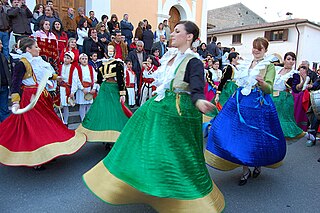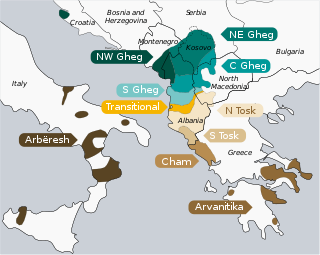
Wilfried Fiedler (7 May 1933 - 11 September 2019) was a German albanologist, balkanologist, and linguist, known for his significant contributions to the studies of the Albanian language and Balkanology. [1]

Wilfried Fiedler (7 May 1933 - 11 September 2019) was a German albanologist, balkanologist, and linguist, known for his significant contributions to the studies of the Albanian language and Balkanology. [1]
Born in Oberfrohna, Saxony, he studied Slavic studies and other philologies at Humboldt University in Berlin (1951–1955). After completing his studies, he worked as a scientific assistant at the Institute of Folk Culture of the Academy of Sciences of the GDR (1955–1963).
Fiedler first visited Albania in 1957, where he stayed for four months as part of a joint Albanian-German expedition to collect folk songs, resulting in the publication of the volume "Këngë çame" (1965). In 1959, he returned to Albania to gather materials for his dissertation "Research on the Formation of the Plural in the Albanian Language" (1961), and from that year, he began teaching Albanian language, literature, and folklore at Humboldt University in Berlin.
From 1963 to 1968, Fiedler worked at the Linguistics Commission and the Institute for Romance Languages and Culture at the Academy of Sciences of Germany in Berlin. From 1968 to 1988, he led the research group for Balkan studies at the Central Institute of Linguistics of the Academy of Sciences of the GDR. In 1988, he defended his habilitation thesis in Albanology at Humboldt University. [2]
After 1989, Fiedler worked as a professor of Albanology at Ludwig Maximilian University of Munich until 1998, and also lectured at the University of Vienna. From 1999 to 2018, he continued to deliver lectures on Albanology at the University of Jena. In 1991, he was elected as an external member of the Academy of Sciences and Arts of Kosovo, and in 2006, as an external member of the Academy of Sciences of Albania.
Fiedler's major works include "Albanische Grammatik" (1988), co-authored with Oda Buchholz, "Das albanische Verbalsystem in der Sprache des Gjon Buzuku" (2004), a detailed study of the verb system of 16th-century Albanian, and "Formimi i shumësit të gjuhës shqipe" (2010). He also translated several important works of Albanian literature into German, including "The General of the Dead Army" and poems by Martin Camaj and Ali Podrimja.
Wilfried Fiedler is recognized as one of the most important albanologists in the German-speaking world, with an extraordinary contribution to the study and promotion of the Albanian language and culture. [3]
E Bukura e Dheut is an epithet in Albanian mythology and folklore, used in some traditions for a crafty fairy, and in other traditions for a chthonic/earth goddess, the counterpart of e Bukura e Detit and i Bukuri i Qiellit. As a goddess of the underworld and at the same time a personification of springtime, the Beauty of the Earth is evidently an epithet of the Albanian equivalent of the Ancient Greek Persephone, which is considered to be Prende, the Albanian dawn goddess, goddess of love, beauty, fertility, health, and protector of women, also referred to as Zoja e Bukuris "Goddess/Lady of Beauty".
Perëndi is an Albanian noun for God, deity, sky and heaven. It is used capitalized to refer to the Supreme Being, and uncapitalized for "deity", "sky" and "heaven".

Albanology, also known as Albanian studies, is an interdisciplinary branch of the humanities that addresses the language, costume, literature, art, culture and history of Albanians. Within the studies the scientific methods of literature, linguistics, archeology, history and culture are used. However the Albanian language is the main point of research of the studies.
Shqiptar is an Albanian ethnonym (endonym), by which Albanians call themselves. They call their country Shqipëria.

Eqrem Çabej was an Albanian historical linguist and scholar who, through the publication of numerous studies gained a reputation as a key expert in research on Albanian language, literature, ethnology and linguistics.

Albanian is an Indo-European language and the only surviving representative of the Albanoid branch, which belongs to the Paleo-Balkan group. It is the native language of the Albanian people. Standard Albanian is the official language of Albania and Kosovo, and a co-official language in North Macedonia and Montenegro, as well as a recognized minority language of Italy, Croatia, Romania and Serbia. It is also spoken in Greece and by the Albanian diaspora, which is generally concentrated in the Americas, Europe and Oceania. Albanian is estimated to have as many as 7.5 million native speakers.
Bardhyl or Bardhul is an Albanian masculine given name meaning 'the white/bright one', also reflected from the Illyrian name Bardylis and Messapic Barzidihi and Barduli. The same root is found in the Albanian given name Bardh-i (masculine) and Bardh-a (feminine), as well as in the Albanian surname Bardhi, meaning 'the white one'.
Anton Nikë Berisha is an Albanian scholar and folklorist. He has been teaching Albanian at the University of Calabria since 1992, and is considered an expert in Albanian oral and Arbëreshë literature. He is one of the Albanologists who have carried out extensive research on Albanian epic poetry, in particular collecting and publishing Kângë Kreshnikësh, the traditional songs of the heroic legendary cycle of Albanian epic poetry.

Martin Camaj was an Albanian folklorist, linguist, poet, and writer. He is regarded as one of the major authors of modern Albanian prose. His novel Rrathë is considered to be the first psychological novel written in Albanian.
Selman Riza (1909–1988) was an Albanian linguist and Albanologist. Riza was one of the founding members of the Albanological Institute of Pristina in 1953.
This article concerns the morphology of the Albanian language, including the declension of nouns and adjectives, and the conjugation of verbs. It refers to the Tosk-based Albanian standard regulated by the Academy of Sciences of Albania.
The first Albanian-language school in Kosovo was opened in 1889. That was the birth of public education in the well-known cultural and historical city, Prizren. "The history of our education is a story of war of efforts. A story of a small number of people, with a great spiritual world, and with a strong will to be independent."
Gustav Meyer was a German linguist and Indo-European scholar, considered to be one of the most important Albanologists of his time, most importantly by proving that the Albanian language belongs to the Indo-European family.
Maximilian Lambertz was an Austrian linguist, folklorist, and a major personality of Albanology.

Shaban Demiraj was an Albanian albanologist, linguist, professor at the University of Tirana from 1972–1990, and chairman of the Academy of Sciences of Albania during the period of 1993–1997.

Zojz is a sky and lightning god in Albanian pagan mythology. Regarded as the chief god and the highest of all gods, traces of his worship survived in northern Albania until the early 20th century, and in some forms still continue today. The old beliefs in the Sky are pagan beliefs preserved by Albanians since ancient times. In Albanian the god who rules the sky is referred to as i Bukuri i Qiellit, a phrase that is used in pagan contexts for the Sun (Dielli), worshiped as the god of light, sky and weather, giver of life, health and energy, and all-seeing eye. The sacred significance of one of the main symbols of the sky cult – the eagle – has been scrupulously preserved by Albanians, who have always considered it their animal totem. An epithet considered to be associated with the sky-god is "father", thought to be contained in the Albanian noun Zot, used to refer to the supreme entity. A remarkable reflection of Proto-Indo-European mythology associated with the dawn goddess *H₂éwsōs is the Albanian tradition according to which the dawn goddess – Prende – is the daughter of the sky god – Zojz.
Bardhyl Demiraj is an Albanian linguist and Albanologist. He is considered one of the leading experts in the study of Albanian etymology.
Fadil Sulejmani was an Albanologist, university professor, and the first rector of the University of Tetova.
Gunnar Olaf Svane was a distinguished Danish linguist, professor, and scholar specializing in Albanology and Slavic studies. His academic career was primarily associated with Aarhus University in Denmark, where he served as a professor of Slavic studies from 1965 until his retirement in 1994. Svane's expertise extended to medieval Slavic languages and South Slavic languages, but he is particularly renowned for his research on Slavic loanwords in the Albanian language.
Oda Buchholz was a German linguist known for her expertise in the Albanian language. She made contributions to Albanian studies and Balkan linguistics.